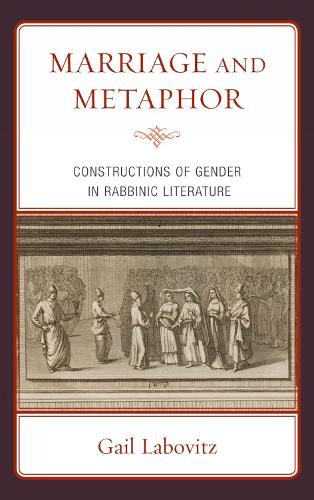
Marriage and Metaphor: Constructions of Gender in Rabbinic Literature
(Paperback)
Publishing Details
Marriage and Metaphor: Constructions of Gender in Rabbinic Literature
By (Author) Gail Labovitz
Bloomsbury Publishing PLC
Lexington Books
24th October 2012
United States
Classifications
Professional and Scholarly
Non Fiction
Literary studies: general
Social groups: religious groups and communities
Gender studies, gender groups
296.444
Physical Properties
Paperback
300
Width 149mm, Height 229mm, Spine 23mm
445g
Description
In Marriage and Metaphor, Gail Labovitz explores gender relations in marriage within rabbinic culture. Labovitz shows how rabbis use the concepts of property and ownership to discuss the roles of a husband and wife, thereby modeling marriage after a business transaction-one in which the wife is seen as an acquisition owned by and subject to the husband. This ownership metaphor is clearly present in all strata of rabbinic literature and the book explores how it continues to guide rabbinic thinking, serve as a tool for legal reasoning, and produce new linguistic applications. With a close and careful reading of rabbinic texts, Labovitz applies metaphor theory and feminist linguistics to demonstrate the ways in which rabbis regularly use information from the realm of property and commercial transactions to structure their understanding of marriage and gender relations.
Labovitz examines the qualities deemed "masculine" and "feminine," seeking out the methods used by members of rabbinic culture to promote, contest, legislate, and exemplify the ideas and ideals associated with proper, normative gender roles. What comes of this is a striking work of feminist scholarship that should be read by those interested in gender studies and Jewish culture and history.
Reviews
This highly original and important study demonstrates how language associated with acquisition underlies rabbinic Judaism's legal understanding of marriage. While carefully and convincingly analyzing the rabbinic metaphor of women as 'ownable,' Gail Labovitz also argues for essential transformations if women are to attain an equal status in the Judaism of the future . -- Judith R. Baskin, University of Oregon
Labovitz advances the project to a new level, revealing, through her readings, false dichotomies in our thought processes themselves. * Rethinking Jewish Weddings *
Labovitz's close textual analyses emerge from the intersection of linguistic theory and Jewish studies....Labovitz advances the project to a new level, revealing, through her readings, false dichotomies in our thought processes themselves. * Sh'ma, A Journal Of Jewish Responsibility *
Marriage and Metaphor argues that the dominant model by which rabbis and rabbinic culture construct marriage and gender relations in marriage is a metaphor of property and ownership. Gail Labovitz does not shy away from the broader implications of her workespecially as a rabbi, wife, mother, and a teacher of future rabbis and Jewish educators. She provocatively ends her book by raising some disturbing questions about her own status as a scholar, rabbi, teacher, and Jewish wife. These are bold and gutsy things to do and Labovitz does them brilliantly in this important study. -- Laura S. Levitt, author of Jews and Feminism: The Ambivalent Search for Home and editor of Judaism Since Gender
In Marriage and Metaphor, Gail Labovitz provides an illuminating analysis of the metaphors that structure and shape rabbinic conceptions of marriage. She draws on the cognitive metaphor theory of George Lakoff and Mark Johnson, who understand metaphor as the primary means through which humans reason and imagine. Metaphors profoundly structure ourlives, shaping and constraining our knowledge and imaginations. Accordingly, Labovitz argues that metaphors do not simply convey rabbinic ideas about gender, but that they serve as the central means through which a culture's gender system is made. She probes the implications of the dominant rabbinic metaphor of marriage as an act of acquisition and demonstrates the stark disparities of power and agency these metaphors encode. ...Labovitz makes visible the deep significance of ownership paradigms in rabbinic thought, illuminating how profoundly the cognitive framework of marriage as acquisition structures rabbinic gender relations. Labovitz makes a convincing argument that these power differentials cannot be defanged by professing that rabbinic marriage is 'not really' an act of acquisition or that the rituals of marriage are 'merely symbolic.' The metaphors of marriage have a powerful and pervasive reach. Amidst her recognition that paradigms of acquisition characterized her own wedding ceremony and those of many contemporary Jews, Labovitz closes with a moving acknowledgment of her own unsettled questionsand invites further reflection on the metaphors by which we marry. * Conservative Judaism *
Author Bio
Gail Labovitz is associate professor of rabbinics at the American Jewish University, where she teaches rabbinic literature and Jewish law, primarily for the Ziegler School of Rabbinic Studies. She has also served as a senior research analyst for the Feminist Sexual Ethics Project at Brandeis University and as the coordinator of the Jewish Feminist Research Group for the Women's Studies Program at the Jewish Theological Seminary of America.
